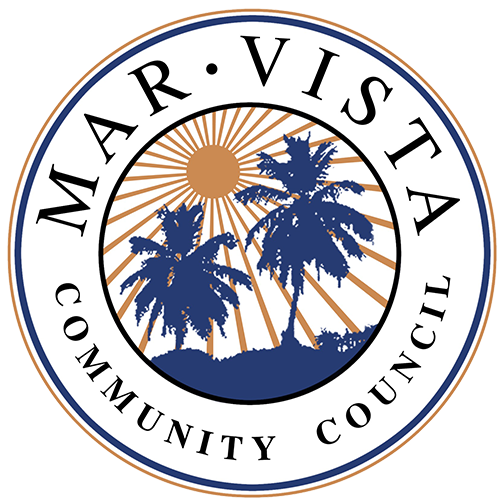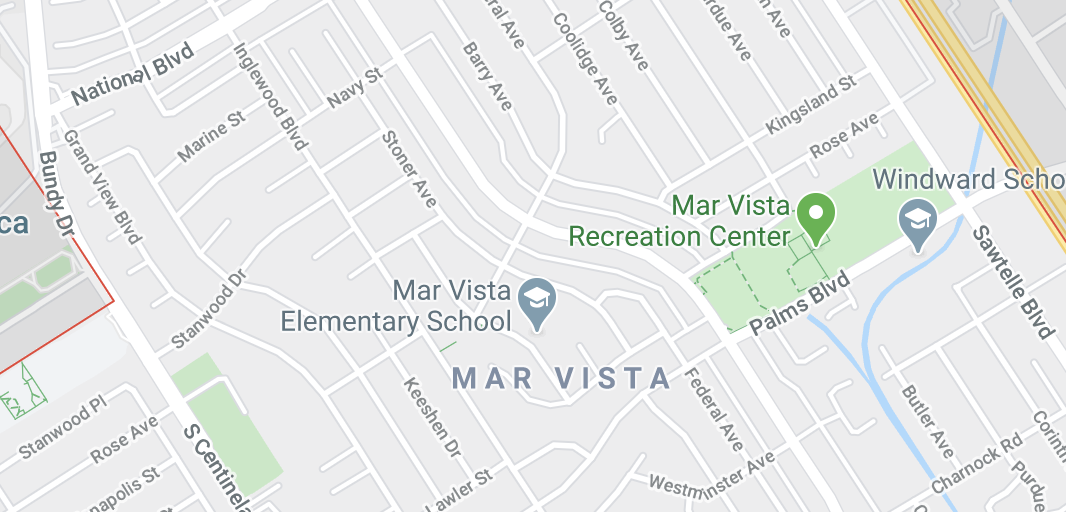Who We Are
The Mar Vista Community Council (MVCC) is one of the 99 Neighborhood Councils within a citywide system that was created in 1999 to connect LA's diverse community to City Hall. It is Article IX of the Los Angeles City Charter. It stated purpose:
To promote more citizen participation in government and make government more responsive to local needs, a citywide system of neighborhood councils, and a Department of Neighborhood Empowerment is created. Neighborhood councils shall include representatives of the many diverse interests in communities and shall have an advisory role on issues of concern to the neighborhood.
Together, we form the grassroots level of the Los Angeles City government. While Neighborhood Council board members are volunteers, they are public officals elected to office by members of their community, also known as Stakeholders. Stakeholders are those who live, work, own property, or have some other formal connection to Mar Vista.
The Neighborhood Council system tailors Los Angeles's municipal government to the City's communities, ensuring that recognition and accommodation of these communities' diversity is built into City governance. As a result, each Council is unique. Though every Neighborhood Council is held to the local, state, and federal standards that other City officials and agencies must observe, each council has its own board structure.
MVCC board members serve two-year terms, takes state-mandated training, and advocates on behalf of Stakeholders. Monthly meetings are held of the full board. All meetings are free and open to the public. Check our Calendar for days/times of meetings.
Mission Statement:
The Mission of the Mar Vista Community Council (MVCC) is to provide a forum for discussion of issues that affect the quality of life of MVCC Stakeholders, and to facilitate stakeholder communication and serve as the advocate for the Council area with officials of the City of Los Angeles and other governmental and non-governmental entities.
As advocates, we provide a forum for discussion of issues that affect Stakeholders' quality of life and take those concerns to the officials of the City of Los Angeles, other governmental and non-governmental entities, and developers. We do this through the process of a Community Impact Statement (CIS). Each CIS is shared with City decision-makers attached to a Council File or reference number within the LA City Clerk's Council File Management System.
The MVCC only can be effective by the combined energy of all the volunteers who choose to become involved in the process both as elected leaders, and also as concerned residents who take the time to involve themselves in the committees, activities, forums, and debates of the Council.
To learn more about our committees, visit our Calendar for upcoming meetings. The MVCC is subject to The Brown Act and agendas must be posted within 72 hours of a meeting. If there is no agenda posted within that time frame, there will be no meeting. We also have a Volunteer Sign Up and a Contact Form if you wish more information.
To receive notices of upcoming meetings with links to agendas, news, and other MVCC information, subscribe to our Weekly Roundup which is emailed out every Tuesday around 10am, excluding holiday weekends.
If you want every agenda emailed to you, click here to sign up by checking the Mar Vista NC box.
Governing Documents of the Neighborhood Council System
Because Neighborhood Councils are created by the Los Angeles City Charter, they are subject to many of the federal, state and local laws that govern other City departments and government entities. Every Neighborhood Council also has its own set of bylaws and standing (aka procedural) rules they follow, too. These documents may be found on our Elections & Bylaws Committee web page.
In addition, Neighborhood Councils must abide by laws preventing workplace violence, sexual harassment and discrimination.
The laws that apply to all Neighborhood Councils include the following:
Americans with Disabilities Act – A federal law designed to protect the rights of individuals with disabilities. Title II of the Americans with Disabilities Act (ADA) applies to the operations of state and local governments.
The Brown Act – The Ralph M. Brown Act is a state law requiring open meetings from government agencies and applies to Neighborhood Council meetings.
Conflict of Interest Laws – Various state and city laws to ensure that government officials are free from bias caused by their own financial interest so they may act in an impartial manner.
Los Angeles City Charter – In 1999, the City Charter established the Neighborhood Council System and the Department of Neighborhood Empowerment which supports the Neighborhood Councils “to promote more citizen participation in government and make government more responsive to local needs…” Charter Section 900.
The Plan for a Citywide System of Neighborhood Councils – This Plan details the workings of the Neighborhood Council system.
California Public Records Act – A state law providing the public access to government records. Neighborhood Councils must abide by a strict time line to respond to Public Records Act (PRA) requests.

Sign Up for to receive our Weekly Roundup via email for updates on MVCC and your community.
Click here to subscribe to our Newsletter and receive details of upcoming activities, meetings, and events of the MVCC.
We want to hear from you.
Your input means a lot. Feel free to contact us with your concerns and important information you want to share.

WEEKLY ROUNDUP & NEWSLETTER LIBRARY

Tips to Prevent Burglary

PREVIOUS POSTS

EMPOWER LA

ALERT LA COUNTY
Register your cell phone number, Voice over IP phone number, and e-mail address with the Alert LA County Emergency Mass Notification System.




